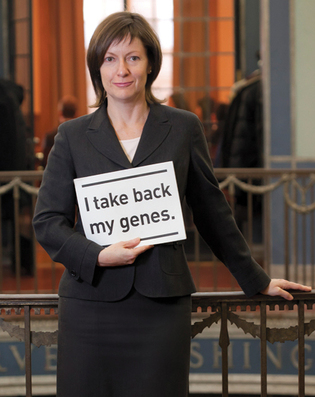 loading
loading
Light & VerityCan genes be intellectual property?A genetic counselor at Yale sues to answer the question.  Terry DegradiView full image“The patenting of genes is probably the one issue that affects every human being in the entire world,” Ellen Matloff says. “Male, female; black, white, Hispanic; sick, healthy—we all have genes. What this will do to the future of medicine is so grave that a few people have to step forward and put their necks out.” Matloff, director of genetic counseling at the Yale Cancer Center, has stuck her neck out. She has signed on to a lawsuit, now before the US Supreme Court, that asks: “Are human genes patentable?” Matloff and other critics say no: genes belong to nature, and patents prevent freedom of scientific research and clinical care. In defense of its intellectual property, Myriad Genetics—the Utah-based company whose patents on genes linked to breast and ovarian cancer are at the center of the case—responds that it has patented manmade genetic copies, called isolated DNA, which are “unique chemical compositions not found in nature or the human body.” The court heard oral arguments on April 15 and will decide the case by the end of June. Matloff, who counsels patients with personal and family histories of cancer, says she has spent most of her Yale career battling Myriad Genetics. In the mid-1990s, scientists from Myriad, various universities, and the National Institutes of Health cloned a pair of genes known as BRCA1 and BRCA2. Mutations in those genes had been shown to predict a high risk of breast, ovarian, and pancreatic cancers. The private, for-profit Myriad swiftly patented the genes and introduced a proprietary test for the mutations. For several years, Matloff and Yale’s cancer genetic counseling center offered BRCA testing to “hundreds of patients” with personal or family histories of breast cancer. Women who tested positive for the mutations could opt for frequent cancer screening or even for a preventive mastectomy or ovary removal. “Suddenly, from out of the blue, our lab received a cease-and-desist letter from Myriad,” Matloff recalls: only the company could perform the tests. (Myriad says it has no record of a letter to Yale.) And the price started rising—from the $1,600 that Yale charged in the late 1990s to more than $3,300 per patient today—even as the actual cost of testing has dropped significantly, she says. “You shouldn’t be able to patent a gene,” Matloff says. “This isn’t like Lipitor: this pill didn’t exist; you’ve gone through research and development; you’ve gone through FDA approval and testing, which is very expensive. This is patenting genes that we’re all born with. The technology for testing those genes, which is sequencing, was already available.” Then, in 2008, came a letter from the American Civil Liberties Union: it was planning to sue Myriad. Would Matloff serve as a plaintiff? Matloff was thrilled. Yale, however, wanted to stay “strictly neutral” on the litigation, a university lawyer says. So Matloff agreed to participate as an individual, not as a Yale representative. In a statement, Myriad responds that its scientists “applied their inventive faculties to a previously undistinguished mass of genetic matter and created a new chemical entity. We believe our innovation was the product of creative, human ingenuity, resulting in significant new applications for human health.” The company also says its tests are “priced appropriately and reflect the value they provide.” Myriad offers financial assistance to poor patients, and its patents “facilitate research,” the company’s website says: “Since the discovery of the BRCA genes more than 18,000 scientists have studied them, publishing more than 9,000 research papers.”
The comment period has expired.
|
|